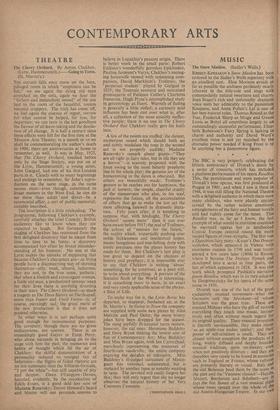THEATRE
believe in Lopalchin's peasant origin. There is better work in the small parts: Robert Eddison's wonderfully gormless Epikhodov, Pauline Jameson's Varya, Chekhov's manag- ing housewife viewed with redeeming com- passion, David Markham's Trofimov, the perpetual student' played by Gielgud in 1925; the Teutonic resource and restrained grotesquerie of Patience Collier's Charlotta Ivanovna, Hugh Pryse's accomplished study in gerontology as Feers. Warmth of feeling is generally a little stifled; a curiously acid influence has been cast over what is, after all, a collection of the most amiably ineffec- tive people; there is no one in The Cherry Orchard that Chekhov really gets his knife into.
A few of the points are muffed: the distant, mysterious sound which should both set and subtly modulate the tone in the second act is not properly audible; Madame Ranevsky's remark about giants—"They are all right in fairy tales, but in life they are a horror"--is scarcely projected with the force owing to the most bitterly prophetic line in the whole play; the genuine joy of the homecoming in the dawn is obscured. But others are beautifully made: Trofimov's gesture as he reaches out for happiness, the jack o' lantern; the simple, cheerful cruelty of the manservant who also, in his way, represents the future, all the accumulation of effects that go to make the last act the most affectin& farewell in dramatic litera- ture. Fifty years after, it is tempting to suppose that, with hindsight, The Cherry Orchard 'means more' than it can ever have meant before 1917; the zeal of Trofimov, the echoes of "manure for the future," the reality which, impartially pushing over noble fecklessness and intellectual hopes, means bungalows and tree4elling, drop with ironic precision into the places history has made for them. But Chekhov's last play is too great to depend on the chances of history and prophecy; it is impossible ever to say that Chekhov is writing 'about' something, for he contrives, as a poet will, to write about everything. A preview of the Socialist Sixth of the World is interesting: it is something more to have, in an exact and very rarely applicable sense of the phrase, a Slice of Life.
To make way for it, the Lyric Revue has departed, to reappear, freshened up, at the St. Martin's. In Going to Town the company are supplied with some new pieces by Alan Melville and Paul Dehn; the more wintry jokes have been dropped for the season. The moss joyfully ill-natured turns remain, however, the old ones: Hermione Baddeley and Dora Bryan making the lowest sort of fun of Contemporary Art; Miss Baddeley and Miss Bryan again, with Ian Carm:chael, mercilessly representing the resources of fourth-rate vaudeville; the entire company enjoying the delights of television. Miss Baddeley's ill-judged caricature of Mistin- guett has vanished, unlamented, but is replaced by another lapse as notably wanting in taste. The devoted will easily forgive her this; they will only regret that she no longer observes. the natural history of her Very Common Common.
CHRISTOPHER SMALL


































































 Previous page
Previous page